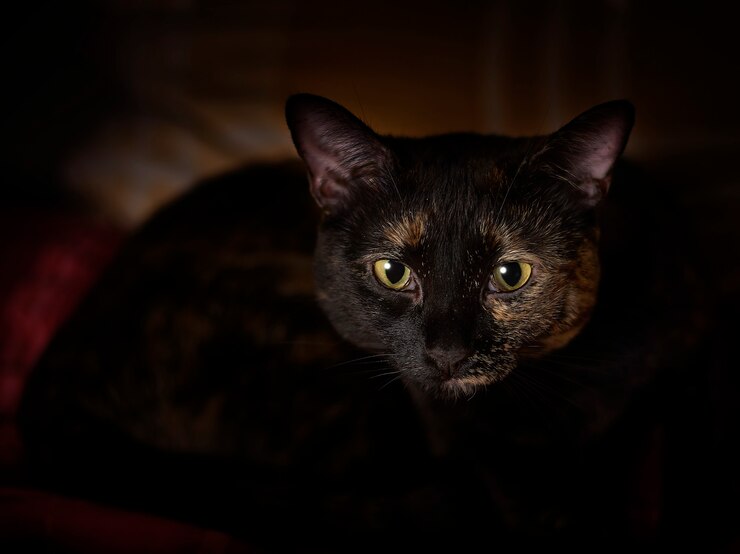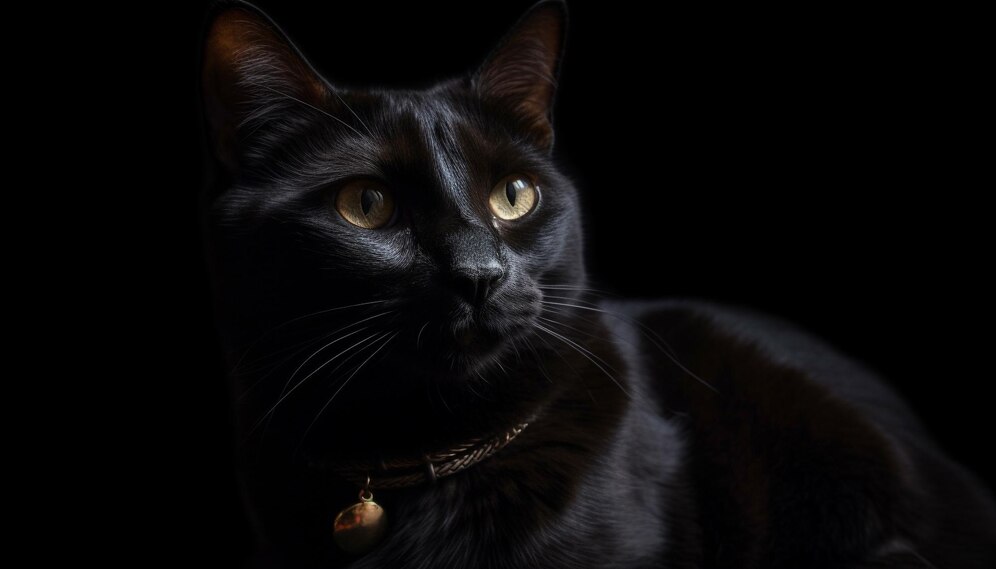If you’ve ever watched your cat confidently maneuver around the house at night, you may wonder if they truly have “night vision.” While cats are incredibly skilled at seeing in dim light, they still need at least a minimal amount of light to see clearly. Here’s everything you need to know about your cat’s nighttime vision, whether you should leave a light on for them, and how they compare to dogs in the dark. For those curious about how cats experience other senses, like color, check out Can Cats See Colors?
Do Cats See in the Dark?
Cats are often praised for their impressive ability to navigate in low-light conditions, leading many people to wonder, “Can cats see in the dark?” The short answer is: not entirely. While cats possess remarkable adaptations that enable them to see in dim light much better than humans, they still need some level of light to see clearly.

Can Kittens See in the Dark?
Kittens, like adult cats, have a natural ability to see better in low light than humans. They cannot see in complete darkness; they still need some light to navigate effectively. While their vision improves significantly as they grow, making them adept at exploring in dimly lit spaces, it’s important to provide a safe and comfortable environment for them.
Can Cats See in Complete Darkness?
Cats have remarkable low-light vision, but they can’t see in complete, total darkness. Like all creatures, including humans, cats need some light to activate their eyesight. Fortunately, they only need about one-sixth of the light that humans require. Dr. Jamie Lovejoy, DVM, explains that cat’s eyes contain a special layer called the tapetum lucidum—a reflective tissue that bounces light back onto the retina, enhancing the light available for their eyes to process. This structure allows cats to see in conditions that are nearly dark, but in total darkness with no light source, even cats won’t be able to see.
Mythili Devarakonda, an Evergreen Content/SEO reporter, points out that although cats don’t have perfect “night vision,” they can navigate dark spaces using their other heightened senses. The combination of excellent hearing, smell, and sensitivity to movement makes them exceptional at finding their way in low light. If you notice that your cat is particularly clingy at night, you may find Why Does My Cat Follow Me Everywhere? insightful.
How Cats See in the Dark
According to Christine O’Brien, an expert on feline behavior, cat’s eyes are designed for low-light hunting, she appreciate to their large, vertically slit pupils that expand to let in more light. Their pupils can grow roughly 50% larger than human pupils, allowing them to take in much more light in low-visibility settings. Additionally, their eyes are equipped with a high number of rod cells—cells responsible for detecting light and motion. While cats see the world primarily in shades of grey, blue, and green, this setup makes them very efficient at sensing movement in dim conditions.
Tabitha Kucera, RVT, CCBC, KPA-CTP, explains that cat’s incredible night vision has roots in their survival as crepuscular animals, meaning they are most active at dawn and dusk. This twilight timing gives them the ideal conditions for low-light hunting. If you’re intrigued by other unique cat behaviors, you might enjoy Why Does My Cat Follow Me to the Bathroom?.
Should I Leave a Light on for My Cat at Night?
Most cats will do just fine without a light on at night, as their eyes are adept at navigating low-light settings. However, there are some exceptions where a little light may be beneficial. If your cat has vision issues or seems nervous in total darkness, a soft night light can provide comfort. Additionally, if you’re concerned about your cat’s hydration, our article on Why Is My Cat Not Drinking Water? Causes, and Solutions provides valuable tips.
Signs that your cat may feel anxious in the dark include:
- Crying or yowling when the lights are turned off
- Anxious body language, such as a puffed-up tail, ears pinned back, or tail flicking
- Aggression or startled reactions when approached in the dark
If your cat shows any of these behaviors, a dim nightlight might help ease their anxiety and provide reassurance.
Are Cats Okay in the Dark?
Cats are often mistaken for being purely nocturnal, but they’re actually crepuscular, meaning they’re most active at dawn and dusk. In these twilight hours, cats’ low-light vision is at its best, allowing them to spot potential prey with ease. For more insights on other peculiar behaviors, see 9 Reasons Why Cats Hate Water.
Nandini Balial, an expert in animal behavior, notes that in most households, ambient light from street lights or electronics ensures cats are never in complete darkness. This environment is ideal for them to move around comfortably without feeling disoriented.
Can Cats See if There is No Light?
While cats excel in low-light environments, they still need at least a little light to see. In total darkness, even cats’ extraordinary eyes can’t function, just like ours. However, they can make up for this with their other senses, including their acute hearing and sense of smell, which help them stay oriented in dark spaces.
With even a little light, such as from a nearby street lamp or nightlight, cats can rely on their eyes and move around with ease. And if you’re wondering about other cross-species questions, like whether A Dog Can Get a Cat Pregnant, we’ve got you covered!
Can Dogs See in the Dark Like Cats?
While dogs can see in low light much better than humans, they don’t quite match up to cats in the dark. Like cats, dogs have a tapetum lucidum, which helps them reflect available light to the retina, improving their vision in dim environments. Dr. Tiffany Tupler, a graduate from the University of Florida, notes that while dogs’ eyes can handle low light better than ours, they aren’t as specialized as cats’ for extreme low-light settings. Dogs tend to have larger, rounder pupils and are also adept at detecting movement in low-light settings, but they require more light than cats do to see effectively.
Dogs are better suited to seeing at dusk and dawn, though it’s still much more functional in darkness than human vision. If your dog roams around at night, they may benefit from low lighting, especially if they seem hesitant in the dark.
What If I Suspect My Cat Has Vision Problems?
If you notice signs of vision issues in your cat, such as bumping into objects or hesitating in familiar areas, it’s a good idea to consult a veterinarian. Some conditions that affect vision can be age-related, while others could stem from injuries or health issues. A veterinary ophthalmologist can conduct thorough assessments to identify any eye conditions affecting your cat’s comfort or sight.
Look out for these signs if you suspect vision issues in your cat:
- Excessive tearing or squinting
- Cloudiness or discharge in the eyes
- Reluctance to move around in dim light
- Noticeable signs of stress in low light settings
If you suspect any problems, seek a veterinarian’s help to ensure your cat’s vision stays sharp and their comfort remains high.
Read Also
Bathing a Cat: A Step-by-Step Guide to Keeping Your Cat Clean and Calm



